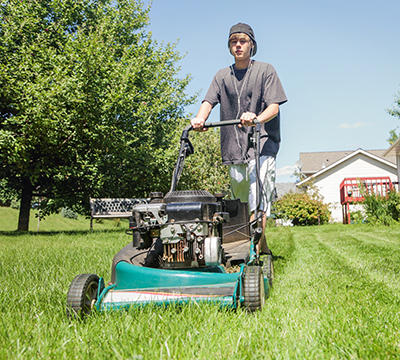By Jane Nelsen and Lynn Lott (Adapted from Positive Discipline for Teenagers)

Teenagers do not break promises to do chores because they are premeditating con artists. We believe teens fully intend to keep their promises when they are made. So what happens?
They forget! Why do they forget? Because they are busy being teenagers, and chores are not priorities for them. Their priorities are friends, cars, zits, clothes, music, texting, trying to figure out what to do about grades, sex, drugs, individuating (finding out who they are separate from their parents) and getting a date for the Prom six months in advance.
Chores are not even in the top 100 of their concerns. Does this mean they should be excused from doing chores? Absolutely not. Kids need to participate in chores to learn responsibility, cooperation, give and take, and many other life skills. It does mean that parents can be much more effective in achieving the goal of teen participation in chores with dignity and respect when they "get into the teens world" and understand the life tasks and priorities of teenagers. Then use follow-through.
Follow-Through
Follow-through is an excellent tool for parents who understand the world of teenagers, and the importance of their participation in chores. There are four steps to follow-through, four traps that defeat follow-through, and four hints for effective follow-through.
Four Steps for Effective Follow-Through
- Have a friendly discussion where everyone voices his/her feelings and thoughts.
- Brainstorm for possible solutions and choose one that is mutually agreeable.
- Agree on a specific time deadline (to the minute.)
- Understand children well enough to know that the deadline probably won’t be met and simply follow through with your part of the agreement by holding the child accountable.
The concept of follow-through is simple unless you make the mistake of falling into one or all of the:
Four Traps That Defeat Effective Follow-Through
- Wanting kids to have the same priorities as adults.
- Getting into judgments and criticisms instead of sticking to the issue.
- Not getting agreements in advance, which include specific time deadline.
- Not maintaining dignity and respect for child and self.
Once you have the four steps for effective follow-though and the four traps that defeat effective follow-through under your belt, you will still run into trouble if you don’t follow the four hints for effective follow through:
Four Hints for Effective Follow-Through
- Keep comments simple and concise. (“I notice you didn’t mow the lawn. Would you please do that now.”)
- In response to objections, ask: “What was our agreement?”
- In response to further objections, shut your mouth and use nonverbal communication (point to your watch, smile knowingly, give a hug and point to your watch again).
- When the child concedes to keep the agreement (sometimes with seeming annoyance), say, “Thank you for keeping our agreement.”
Some have objected that if follow-through doesn’t work, the teen should experience a consequence. What they really mean by a consequence is some kind of punishment such as extra chores or missing time with friends.
Those who are familiar with Positive Discipline know that we don’t advocate any form of punishment. Some believe the only alternative is permissiveness—which is another “no, no” in Positive Discipline. We advocate kindness AND firmness, connection before correction, and focusing on solutions “with” your teen. There are many Positive Discipline tools that meet these criteria. Follow-through is just one tool that is very effective when parent and child have a good relationship and are not engaged in a power struggle or revenge cycle. If follow-through doesn’t work, it might be your clue to stop all “discipline tools” and focus on making sure you have a good connection with your teen.
One way to do this is to acknowledge what might be going on. “I’m getting the feeling that we are engaged in a power struggle, and I can see what I’m doing to create that. I apologize. You mean too much to me to let that hurt our relationship. Let’s take some time out and then start again.”

